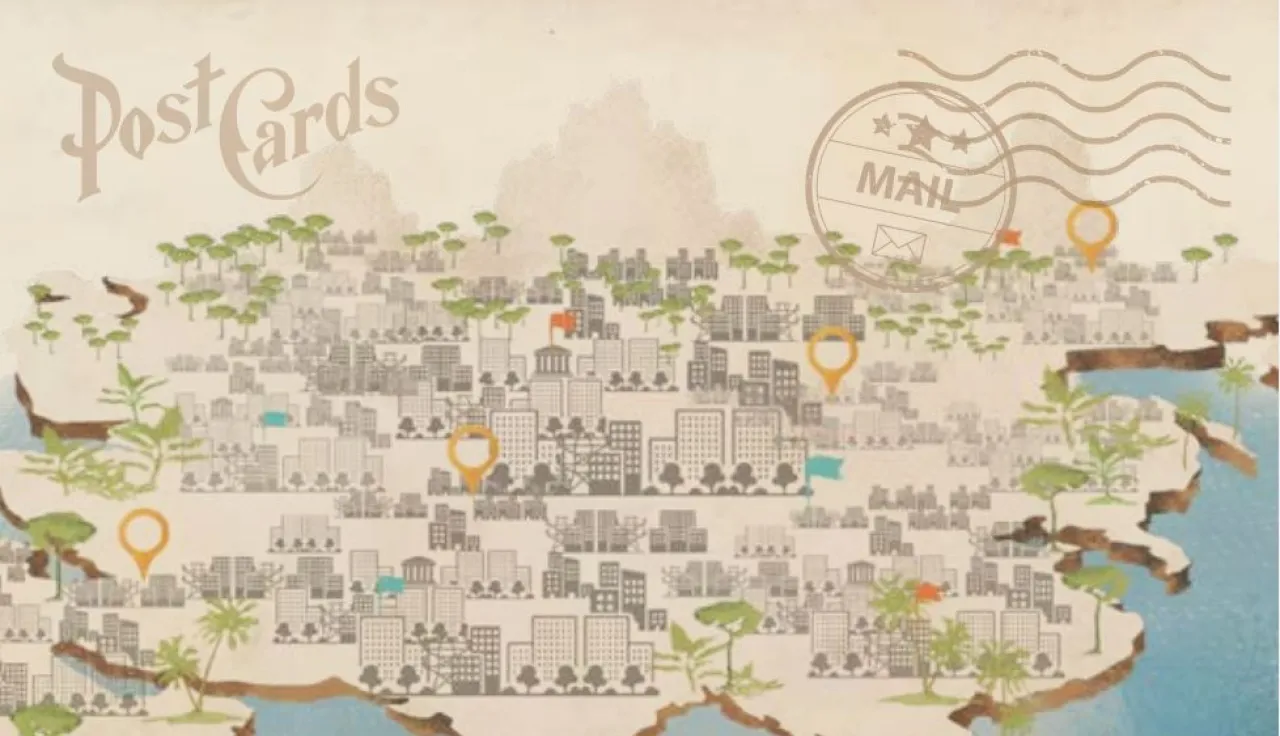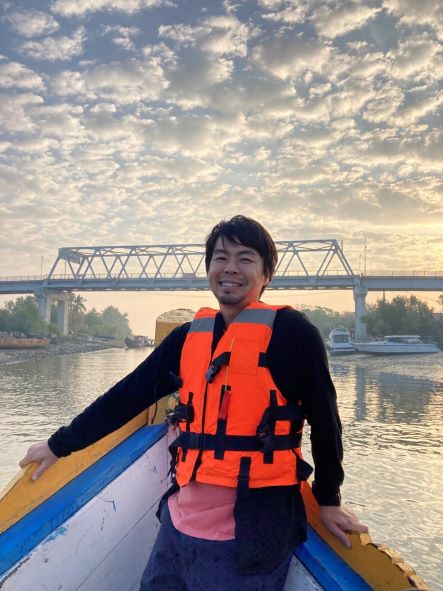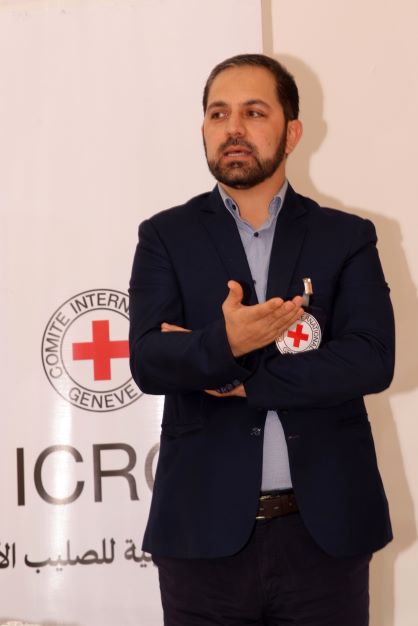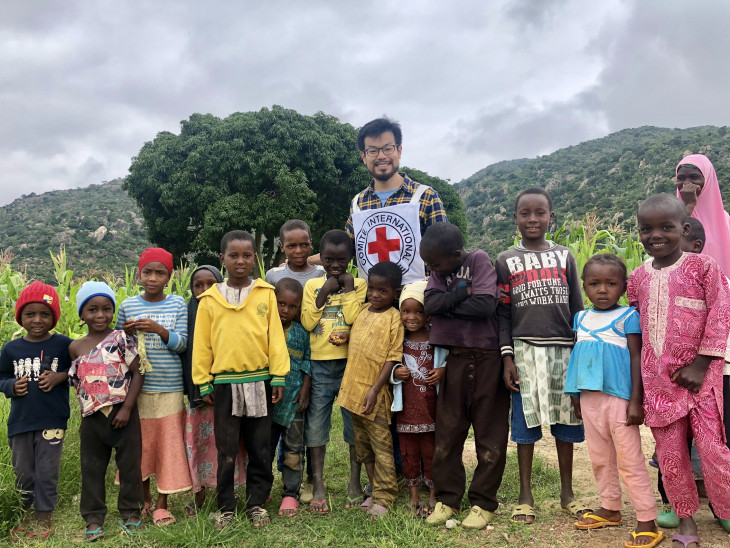Humanitarian Journeys: ICRC staff share their experiences from the field — 2022

The International Committee of the Red Cross (ICRC) employs close to 20,000 people in over 100 countries. These humanitarians face unprecedented challenges as they work in difficult circumstances and in conflict-hit places. But their passion to have a positive impact on people's lives makes them overcome obstacles while travelling thousands of miles away from their families to deliver much-needed help to people affected by conflict and other violence.
Tough to measure impact of humanitarian work

Japan: Masayoshi Mita, Protection Team Leader (Rakhine State, Myanmar)
Humanitarian work can be hard. The work happens in the background and is usually invisible, with the impact difficult to measure, says Masayoshi "Masa" Mita, a humanitarian aid worker with the International Committee of the Red Cross (ICRC).
To buttress his point, Masa recalls his first mission with the ICRC as a protection delegate at Nablus in Palestine in 2012, which left a lasting impression on him.
An elderly woman, who was repeatedly affected by protracted armed conflict in the region, once sarcastically told him, "Thanks to this conflict, I can meet many foreigners from different countries." She was smiling but her eyes gave away the impact of violence on her life, recalls Masa. "The ICRC delegates and other aid workers had supported her in several ways, but she felt there had been almost no positive impact in the long run," he recalls. "I felt powerless for the first time." Yet, to make a difference in someone's life, even if it is only a small degree of change, is extremely rewarding, says Masa.
Currently posted on his fifth mission in Sittwe in Rakhine State of Myanmar, Masa leads the protection team there. He has also worked in Afghanistan, Tajikistan, Thailand and Malaysia. After the current assignment ends, he will head to Jakarta, Indonesia, as a humanitarian affairs adviser. To work for the ICRC means getting involved in someone's life, says Masa. "This is why we are expected to do our best."
Having studied international humanitarian law (IHL), Masa is able to analyse humanitarian issues in a technical manner. "If there is an armed conflict, unfortunately, there are always alleged IHL violations," he says. To find solutions to armed conflict, however, goes beyond what is written in the law. "Law is important, but the reality is different. I have learned that the ICRC always tries to find the best possible solutions, while also remaining flexible," he says.
Communication skills are also critical for working with the ICRC as engaging with different people, both internally and externally, is a major part of the job. For this, Masa suggests developing listening skills and nurturing relationships with colleagues.
"I would like to continue staying close to people affected by armed conflict," says Masa, who is as committed to changing people's lives today as he was on his first day on the job.
At home in the ICRC

Afghanistan: Ahmad Khalid, Head of Office (Turba, Yemen)
A calm smile on his face, Ahmad Khalid is one of those people whose positivity and charm immediately brighten your day. Currently head of the ICRC's office in Turba, Yemen, Ahmad says his sense of humour has carried him through the good and the bad times.
Belonging to Afghanistan, Ahmad joined the ICRC in 2004 as a radio operator. He then moved into the communications team and worked there for a long time. Thereafter, he became the adviser to the head of the Mazar-e-Sharif subdelegation, before being promoted as the head of office in 2020.
In 2022, Ahmad applied to become a mobile staff and was appointed the head of office in Turba district (south Yemen) in Taiz, which is known as one of the most conflict-ridden governorates in Yemen.
Having spent nearly 18 years with the ICRC, Ahmad has many remarkable memories to share, but one stands out for him: "I was on my way to deliver a Red Cross message to the family of a person who had been missing for ten years. Unbeknownst to me, the family had organized a mourning ceremony in the mosque for their missing son that very day. Imagine the joy, the shock and the gratitude when they came to know that their son was in fact alive! I will never forget those tears in his father's eyes."
What keeps Ahmad interested and invested in his work are the challenges that come up from time to time. When one stops enjoying their work or when it stops piquing their curiosity, one must take stock and think about an alternative career path. He says this was his motivator for wanting to become a mobile staff member with the ICRC – he wanted a more challenging role to help him learn and grow.
"I have stayed on with the ICRC because of this magic – the ICRC magic! It keeps you attached to the organization. I've always felt at home – it never feels like work."
According to Ahmad, anyone wanting to join the ICRC should be mentally prepared for different scenarios. It's important to remember that while the organization is often the first responder during a conflict, sometimes even they can't respond at all. For Ahmad, the journey has been rewarding.
While having experienced lows, he has also been part of teams meeting successful outcomes. This makes everything worth it. Of course, it's not easy to be away from family, and travelling from Yemen to Afghanistan is a task. But seeing smiles on the faces of those he has been able to help tells Ahmad that he has been successful in his mission.
Making her mark in the aid sector

India: Malavika Subba, Communication Delegate (Baghdad, Iraq)
It's Friday afternoon and the weekend vibe has set in well. Malavika Subba, who is from India, munches on some pistachios that a colleague from Afghanistan gifted her and talks of the travel bug that caught her young, of being a people's person and about learning the definition of resilience from people impacted by conflict.
Malavika joined the International Committee of the Red Cross (ICRC) almost a decade ago in 2013. She started her journey in New Delhi, India, and is now on her way to Bangkok, having recently finished a six-month assignment in Iraq as a communication delegate.
Prior to that, Malavika was in Myanmar as an operational communication delegate. Before the ICRC, Malavika was with an advertising and marketing firm and it was here that she first worked closely with the humanitarian aid sector. "I worked on a few ad campaigns for the United Nations Population Fund and International Labour Organization and that sparked my interest." At the time, Malavika was keen to embark on a different adventure but it meant leaving behind family, country of origin and familiar places. However, as a child of an Indian Army officer, Malavika is no stranger to moving every two years. A posting meant a new school, new neighbourhood, new friends! "I learnt to adapt and even welcome change. With the ICRC, too, I am always excited to see where and what my next mission will be," she says.
"Once I joined the organization in 2013, I travelled extensively and visited most ICRC delegations in the Asia-Pacific region. This exposure to our work on the ground helped me gain a wider understanding of what we do, which in turn led me to change from resident staff to mobile delegate in 2020," she adds.
As a mobile delegate, Malavika works in a new location with a new team every year or two. "It is challenging, but you need to get to know the people and understand and adapt to each other's ways of working," she says.
Each assignment with the ICRC has been a unique learning experience. While working in Myanmar during the humanitarian crisis in 2020, Malavika saw first-hand the professionalism and neutrality shown by her colleagues as they continued to work for the community despite the many challenges.
Malavika also found the resilience of the communities in central Iraq deeply inspiring. "These people have lived through years of conflict and yet they are so generous, open to talking about their experiences and appreciative of our work," she says. Malavika's advice to anyone wanting to join the ICRC is to keep an open mind. "Be enthusiastic about the work and the people you will work with. Be patient, ask a lot of questions, listen and observe. We need people with a passion for humanitarian work, but we also need people who are ready to adapt and are agile in their thoughts and actions," she says.
Thriving in diversity

China: Ting Fang, Protection Delegate (Port Harcourt, Nigeria)
Elders in Chinese families are categorical – one must never eat anything cold in the morning because it messes the body. Growing up in China, Ting Fang assumed that anyone who cared for their well-being would, naturally, live by the instruction. That was till he moved to England for some months and saw most people around him enjoy cornflakes with cold milk for breakfast. It both shocked and amused Ting that they were doing the opposite of what he was taught but still living healthy lives. "It was an eye opener. I learnt that people do things differently in different places and I can accept their ways as normal and of value. I liked it," he says, laughing over the memory.
Now based in Port Harcourt (Nigeria) as a delegate with the ICRC, Ting is convinced that people are innately similar, across geographical and cultural differences. "Over the last few years, I have also lived in Malawi, Switzerland and Yemen and my experience is that we can relate with one another once we break the ice," he says.
An engineer who worked in the corporate world in Beijing and then changed tracks to join the humanitarian sector, Ting shares that two experiences from his childhood shaped his desire to correct injustice. "My father used to tell me how he faced discrimination because he had one eye surgically removed. His stories used to make me feel very sad about the victimization of people who are different in a way that is out of their control. Also, I experienced exclusion when I moved away from home for middle school," he says. Apart from these, he says there came a point while working in the private sector when he felt he wanted a simpler lifestyle. "So, I eventually went to work with an NGO in Malawi on HIV/AIDS prevention. That cemented my desire to work in the aid sector," he says.
While being fully committed to his work, Ting also acknowledges that it is challenging on different levels. "Saying 'no' can be really difficult when we meet people who are vulnerable but we either don't have enough resources or similar priorities for the mission or our mandate is different. As he continues his humanitarian journey, Ting wants to be an honest team member and leader and looks forward to taking on diverse assignments with more responsibilities.
"I'm even brushing up my Arabic skills in the hope that it will be useful in the field someday. Also, I have a boss who knows five languages and is learning the sixth, so it is peer pressure too," he laughs.
